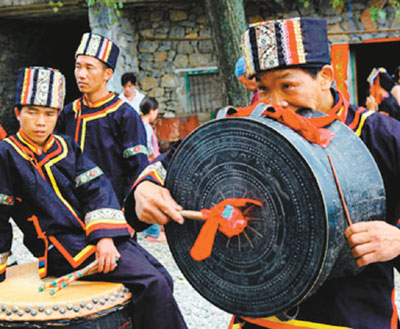|

WEI ZHENLI has just finished teaching children how to play bronze drums. After they have gone he feels lonely and worried about the future of the thousand-year-old instrument.
“Television, cell phones and the Internet have changed the lives of villagers, and traditional culture is losing its popular appeal, especially with young people,” said Wei, a native of Lanyang Village, Donglan County of Hechi City in South China’s Guangxi Zhuang Autonomous Region.
“There are few people who can play bronze drums well, and many are in their 40s or 50s,” Wei said of the instrument, which is a cultural relic of ethnic groups in South China.
Wei said that young people leave his village to work in big cities, so people in their 40s and 50s take on the task of teaching children the drums.
Dating from 200 B.C., bronze drums used to be a must-have instrument for a family, and it is a tradition for local people to play drums to summon rain and a good harvest. Currently, there are only 2,400 bronze drums in the world, more than 1,400 of which are in the city of Hechi.
Wei’s father, Wei Wanyi, who has collected more than 40 of the instruments, is considered the “king of the bronze drum.”
As his father grows older, Wei Zhenli is taking on the responsibility of passing on bronze drum culture and teaching people the skills to play the instrument. He has also led the drum team of Donglan county to perform in cities such as Beijing, Shanghai and Nanning.
“During the Great Leap Forward campaign from 1958 to 1960, almost all metal things, including the bronze drums, were melted down producing steel. Hundred-year-old bronze drums were destroyed at that time,” said Liang Fulin, the former director of the cultural heritage management station of Hechi.
Liang said businessmen had rushed to his village to purchase ancient drums from local people to make greater profits, which also led to the loss of the original drums.
According to a survey by the management station in 2000, only 22 out of 87 examined bronze drums in Hechi remained intact. Nine were badly damaged and could not be used again, Liang said.
Both the government and villagers have gradually realized the importance of protecting and passing on the ancient culture, Liang said.
“A single bronze drum is a story, and also an irreplaceable symbol of this area,” said Li Gang, director with Folk Opera Department of the Public Art Museum in Hechi.
Liang said some players of the instrument have made great efforts to regain the techniques of producing ancient drums, only to find that new bronze drums are not as good as the ancestral ones in quality and timber. To preserve the drums and culture, experts call on the local government to designate a district for the preservation of drum culture.
(Xinhua)
|

